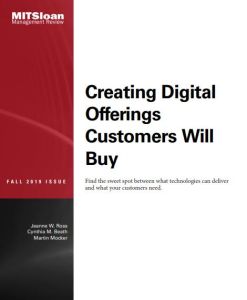Join getAbstract to access the summary!

Join getAbstract to access the summary!
Jeanne W. Ross, Cynthia M. Beath and Martin Mocker
Creating Digital Offerings Customers Will Buy
Find the sweet spot between what technologies can deliver and what your customers need.
MIT Sloan Management Review, 2019
What's inside?
Take an in-depth look at multiple examples of how companies have improved their digital innovation strategies.
Recommendation
Digital innovation is critical for companies that want to thrive. Management must craft and implement strong development strategies. This expert analysis by Jeanne W. Ross, Cynthia M. Beath and Martin Mocker for MIT Sloan Management Review describes key characteristics to include in innovation plans to improve operations. The recommendations aren’t groundbreaking, but the article shines in its use of examples. Each recommendation comes with a real-world case study of a company that implemented the guidance successfully. This well-structured and useful read is suitable for any company pivoting toward digital.
Summary
About the Authors
Jeanne W. Ross is principal research scientist for MIT’s Center for Information Systems Research. Cynthia M. Beath is emerita professor of information systems at the McCombs School of Business at the University of Texas at Austin. Martin Mocker is a research affiliate at MIT’s Center for Information Systems Research and a professor of information systems at ESB Business School at Reutlingen University in Reutlingen, Germany.




















Comment on this summary